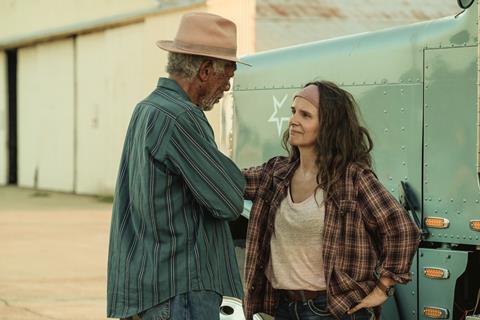
What do international buyers want and what projects are UK film financiers ready to support? Approaching the European Film Market in Berlin, the UK’s film financiers are feeling cautious about what they are willing to invest in while at the same time eager to find projects they can get behind.
“The market has pretty much entirely turned away from drama,” says Stephen Kelliher, managing director of London-based sales and finance company Bankside Films. “Anything that has any kind of downbeat subject matter. Anything that distributors perceive audiences might find challenging has become very difficult, even if the film turns out to be the best possible version of itself and gets into A-list festivals and is celebrated by critics.”
What is continuing to work well, adds Kelliher, is genre films – “especially if they’re elevated, sophisticated, told with a distinctive voice”.
Horrors, thrillers and romantic comedies can all still hit the mark, too. “Really, anything that isn’t drama.”
Projects do not need to be in a high budget range or cast-led. Financiers will take the bait, as long as the concept is appealing enough and there is a strong filmmaking team behind it.
Kelliher cites Australian-produced horror Talk To Me, which is screening as a Berlinale Special following a buzzy Sundance launch, as a perfect template for UK producers to study and “a pinnacle of the type of film that is working at the moment”. Directed by Australian newcomers Daniel and Michael Philippou, the film was made on a modest budget and without major stars but produced by an established production company in Sydney-based Causeway Films. A24 has taken North American rights and is planning a 2000-screen release later this year.
Matthew Wilkinson’s Stigma Films, which produced Romola Garai’s Amulet, and Leonora Darby, Mark Lane and James Harris’ Tea Shop Productions, which has credits including Into The Deep and 47 Metres Down, are the type of UK production companies with which Head Gear Films managing director Phil Hunt says he is increasingly keen to engage.
“When we have one of their projects come through, we’re incredibly favourable to it because we know that they are going to be shepherded by producers who know what they are doing with regards to delivering the creative side of the film, not just being on budget and schedule,” says Hunt, whose company is a prolific player in the production services and debt financing space.
Fewer players than before the pandemic are now active in the UK film financing space. Over the last decade, several familiar names, Aramid, Future Film and The Fyzz Facility among them, have stopped investing. Others have been unable to raise new funds, retreated from the market, or have changed from being investment companies into hands-on production companies.

“It is getting more and more difficult. There are less of us around for as long as I have been inside the investment side to things,” Hunt acknowledges.
“From conversations with producer and financier friends, closing a film has certainly become more difficult in the last 12 months. It seems that plenty of projects will not be able to get their [financing] gap down to a level that the market will accept,” says Paul Hillier, director of media, film and TV at Tysers Insurance Brokers.
Festival support
Some question whether the main film festivals are doing enough to support emerging talent.
“Film festivals have of course had their own financial issues and have to programme a certain number of highly anticipated releases but I also hope that they return to becoming places for discovering films, giving oxygen to new voices, rather than being launchpads for already pre-sold films,” says Peter Touche, senior investment director, media, at Ingenious, whose recent releases include Frances O’Connor’s Emily and Florian Zeller’s The Son.
He hopes this will change as the industry emerges from the pandemic. “TIFF last year seemed to be full of films already pre-sold to the US; the recent Sundance less so and the upcoming Berlin even less so, although it would appear there are very few English-language films,” he says.
Indeed, the other side of the coin is that festivals risk growing away from the market if the films they choose are too esoteric for mainstream audiences.
Fortunately for UK producers, broadcasters and public funders (BBC Film, Film 4, BFI) are still actively supporting new talent and the type of dramas about which other financiers have become wary.
Alongside Head Gear, the most active companies are Great Point Media, Creativity Capital, Silver Reel, Media Finance Capital, Piccadilly Pictures, Ingenious, Ashland Hill Media Finance and the Calculus Creative Content EIS Fund.
Several sales agents and distributors finance as well – Bankside, Pathé, Studiocanal, Signature, Electric Shadow, Anton, Independent and Kaleidoscope among others. Film Constellation has its own in-house financing fund and has provided backing for such titles as The Tutor, Coup, Dance First and Haunted Heart.”
“The landscape for the independent film sector has never been tougher with the combination of production cost inflation, the increasing cost of money due to the rise in interest rates and the understandable reluctance of the older audiences to return to cinemas,” says Ingenious’ Touche.
Ingenious recently had a number one film on Netflix with Bank Of Dave starring Rory Kinnear and Phoebe Dynevor.
Demand for content
Even if dramas are struggling in the indie film market, there is still a voracious demand for content. “The best place to go to is the sales companies,” Hunt advises UK producers looking to complete their budgets. “Not only do they at times put up some of their own cash but most importantly they know where and how to get to the people with cash.”
Late last year, London and Singapore-based 108 Media acquired UK film financier Piccadilly Pictures, launching Piccadilly Pictures APAC. Alongside its UK and European activities, which will still be overseen by Piccadilly co-founders Christopher Figg and Robert Whitehouse, the idea is to create a new content investment fund headquartered in Singapore for the pan-Asian region focusing on credit-based opportunities across the creative IP infrastructure.
It remains to be seen what level of support the restructured outfit will give UK producers. None of the company principals were available for interview.
Zurich-based Silver Reel is an example of a financier now asking for more direct control of the projects in which it invests.
“Sometimes [in the past] we’ve done four or five films a year. That is not something that we would do [now]. We only take on projects that we can actively produce or co-produce. We will always need a certain level of control and we will always be involved creatively. We’ve become very hands on,” says CEO Claudia Bluemhuber.
The company is actively “looking for projects especially from the UK and with UK talent attached, both for film and television”, adds Bluemhuber.

Silver Reel’s recent credits include Paradise Highway with Morgan Freeman and Juliette Binoche, Shattered starring John Malkovich and Frank Grillo, and UK co-production Fallen. It is now developing new UK family movie Robin And The Hood with Matt Williams of Future Artist Entertainment.
By contrast, prolific London and Los Angeles-based Ashland Hill Media Finance remains primarily a lender. The company, set up last year by Joe Simpson, Simon Williams and Jonathan Bros, has a line of capital available from an undisclosed US fund.
“We do senior loans so we are lending against distribution contracts, we’re lending against production incentives, tax credits and the like. We also do some gap financing,” Simpson says of what he described as the company’s “long-established” film financing model.
Simpson believes reports of the death of the independent financing model are greatly exaggerated, pointing to the huge number of projects coming across his desk. “If there is a credible finance plan, then absolutely we are here to engage with UK productions and sales companies,” he says.
Ashland Hill recently financed Neil Marshall’s new €5m crime thriller Duchess, starring Charlotte Kirk and produced by Emily Corcoran and Kristyna Sellnerova for Cork Films. However, he also described Duchess as an “outlier”. On most films, Ashland Hill will come in at a later stage.
“We are a finance company, not a production company,” Simpson states. “Our assessment criteria are very much led by what does the deal look like, what is the credibility of the financing plan.”
The company’s biggest project so far is The Crow, sold by FilmNation, for which it provided a $31m loan. It anticipates doing 20-25 deals this year, deploying $200m in the process. It will fully finance some titles but only if the collateral it is lending against is strong enough.
Its minimum loan size is “usually around $2m”, notes Simpson, so this is not an outfit investing in low-budget arthouse films. However, it is backing UK productions, for example recent shark movie Deep Fear.
With financiers still willing to get behind the right project, and genre being the space in which the most success is being achieved, the lines between genre and drama are fast blurring – and will likely continue to do so.
“The shorter you can summarise what the idea is, probably the more commercial the project is,” Hunt says of a marketplace in which the concept has most definitely become king.

























No comments yet